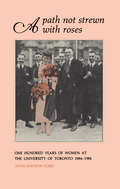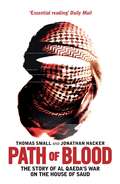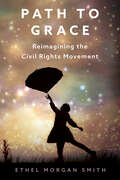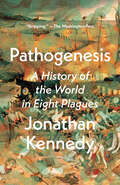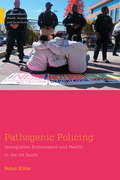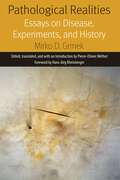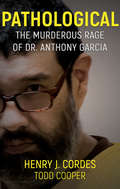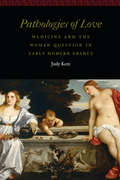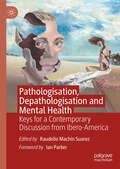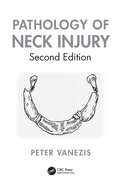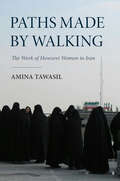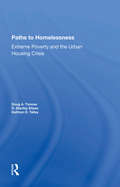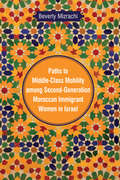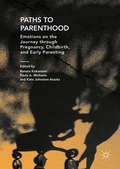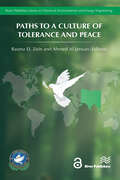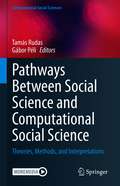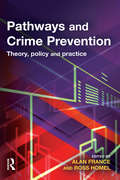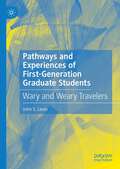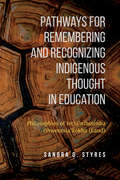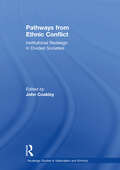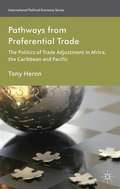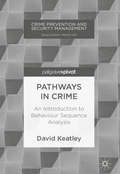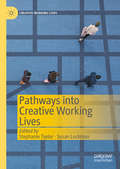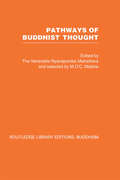- Table View
- List View
Path Not Strewn With Roses
by Anne Rochon FordIn the histories of the University of Toronto which have been written to date women are conspicuous in their absence. It must be stressed that the present book is not intended to stand as a full-scale history of women at the University of Toronto. It is, rather, a preliminary attempt to gather together some of the materials of fundamental significance to women's experince at this University.
Path of Blood
by Thomas Small Jonathan HackerPath of Blood tells the gripping and horrifying true story of the underground army which Osama Bin Laden created in order to attack his number one target: his home country, Saudi Arabia. His aim was to conquer the land of the Two Holy Mosques, the land from where Islam had first originated and, from there, to re-establish a Muslim Empire that could take on the West and win. With the West unpopular with many Saudis at the time of the Iraq and Afghan wars, the Al Qaeda leadership lured impressionable recruits to the organisation with a mix of religious and political rhetoric as well as the promise of glory and heavenly riches. Many joined, and a murderous and highly visible campaign of kidnapping, shootings and bombings was launched across the country. And yet, a far cry from the image they promoted of themselves as single-minded guerrilla tacticians, authors Thomas Small and Jonathan Hacker's new insider evidence reveals the Al Qaeda infighting, the fooling around, and the training sessions which sometimes descended into farce. Yet the threat they posed was unquestionable. Ill-disciplined or not, these were men who killed with impunity, and who tried to acquire a nuclear bomb. Drawing on unprecedented access to Saudi government archives, interviews with top intelligence officials both in the Middle East and in the West, as well as with captured Al Qaeda militants, and with access to exclusive captured video footage from Al Qaeda cells, Path of Blood tells the full story of the terrorist campaign and the desperate and determined attempt by Saudi Arabia's internal security services to put a stop to it.
Path to Grace: Reimagining the Civil Rights Movement (Margaret Walker Alexander Series in African American Studies)
by Ethel Morgan SmithWinner of the 2023 Eudora Welty PrizeThe civil rights movement is often defined narrowly, relegated to the 1950s and 1960s and populated by such colossal figures as Martin Luther King Jr. and Rosa Parks. Many forget that the movement was bigger than the figures on the frontline and that it grew from intellectual and historical efforts that continue today. In Path to Grace: Reimagining the Civil Rights Movement, Ethel Morgan Smith shines light on unsung heroes of the civil rights movement, the ordinary citizens working behind the scenes to make an impact in their communities.Through eleven original interviews with teachers, parents hosting fundraisers for civil right workers, volunteers helping with voter registration, and more, Smith highlights the contributions these figures made to the civil rights movement. Some of these brave warriors worked at the elbows of icons while others were clearing new paths, all passing through history without wide recognition. Path to Grace introduces readers to new witnesses and largely neglected voices. Also included are interviews with such esteemed but less studied figures as writer Gloria Naylor, poet Nikki Giovanni, fashion designer Ann Lowe, and educator Constance Curry. This work of social change situates these narratives in both the past and present. Indeed, many of Smith’s subjects, such as Emma Bruce, John Canty, Andrea Lee, Ann Lowe, and Blanche Virginia Franklin Moore, can trace their ancestry back to enslavement, which provides a direct chain of narrators and firmly plants the roots of the civil rights movement in the country’s foundation. Through historical contextualization and an analysis of contemporary sociopolitical events, Path to Grace celebrates the contributions of some of the nameless individuals, generation after generation, who worked to make the United States better for all its citizens.
Pathogenesis: A History of the World in Eight Plagues
by Jonathan KennedyA sweeping examination of how germs have played a starring role in the most significant transformations in history, from the rise of Homo sapiens to the creation of world religions and the birth of capitalism. According to the accepted narrative of progress, humans have thrived thanks to their brains and brawn, to actions undertaken individually and collectively that have changed the arc of history. In this revelatory book, sociologist and public health professor Jonathan Kennedy argues that the peddlers of the exceptionalism myth massively overestimate the role that reason plays in social change. Instead, it is the humble microbe that wins wars and topples empires. Drawing on the latest research in genetics, economics, sociology, and anthropology, Pathogenesis explores eight outbreaks of infectious disease that made the modern world. Take the rise of Christianity. When a wave of deadly pandemics swept through the Roman Empire in the third century, there were only a small number of Christian communities—but they did a much better job tending to the sick. Their more communal approach saved thousands of lives, and helped turn this tiny, obscure sect into one of the world's great religions. Bacteria and viruses were also responsible for the demise of the Neanderthals, the growth of Islam, the transition from feudalism to capitalism, the devastation wrought by European colonialism, and the rise of the United States from an imperial backwater to a global superpower. By centering disease in his wide-ranging, spectacularly illustrated history of humankind, Kennedy challenges our most fundamental assumptions about our collective past—and urges us to view our current moment as another disease-driven inflection point that could change the course of history. Provocative and brimming with insight, Pathogenesis transforms our understanding of the human story.
Pathogenesis: A History of the World in Eight Plagues
by Jonathan KennedyA sweeping look at how the major transformations in history—from the rise of Homo sapiens to the birth of capitalism—have been shaped not by humans but by germs&“I love this surprising, learned, fascinating book; it brings human arrogance into sharp relief, reminding us that the real masters of the universe are microbes.&”—Cal Flyn, author of Islands of AbandonmentONE OF THE MOST ANTICIPATED BOOKS OF 2023: The Washington Post, Lit HubAccording to the accepted narrative of progress, humans have thrived thanks to their brains and brawn, collectively bending the arc of history. But in this revelatory book, Professor Jonathan Kennedy argues that the myth of human exceptionalism overstates the role that we play in social and political change. Instead, it is the humble microbe that wins wars and topples empires.Drawing on the latest research in fields ranging from genetics and anthropology to archaeology and economics, Pathogenesis takes us through sixty thousand years of history, exploring eight major outbreaks of infectious disease that have made the modern world. Bacteria and viruses were protagonists in the demise of the Neanderthals, the growth of Islam, the transition from feudalism to capitalism, the devastation wrought by European colonialism, and the evolution of the United States from an imperial backwater to a global superpower. Even Christianity rose to prominence in the wake of a series of deadly pandemics that swept through the Roman Empire in the second and third centuries: Caring for the sick turned what was a tiny sect into one of the world&’s major religions.By placing disease at the center of his wide-ranging history of humankind, Kennedy challenges some of the most fundamental assumptions about our collective past—and urges us to view this moment as another disease-driven inflection point that will change the course of history. Provocative and brimming with insight, Pathogenesis transforms our understanding of the human story.
Pathogenic Policing: Immigration Enforcement and Health in the U.S. South (Medical Anthropology)
by Nolan KlineThe relationship between undocumented immigrants and law enforcement officials continues to be a politically contentious topic in the United States. Nolan Kline focuses on the hidden, health-related impacts of immigrant policing to examine the role of policy in shaping health inequality in the U.S., and responds to fundamental questions regarding biopolitics, especially how policy can reinforce ‘race’ as a vehicle of social division. He argues that immigration enforcement policy results in a shadow medical system, shapes immigrants’ health and interpersonal relationships, and has health-related impacts that extend beyond immigrants to affect health providers, immigrant rights groups, hospitals, and the overall health system. Pathogenic Policing follows current immigrant policing regimes in Georgia and contextualizes contemporary legislation and law enforcement practices against a backdrop of historical forms of political exclusion from health and social services for all undocumented immigrants in the U.S. For anyone concerned about the health of the most vulnerable among us, and those who interact with the overall health safety net, this will be an eye-opening read.
Pathological Realities: Essays on Disease, Experiments, and History (Forms of Living)
by Mirko GrmekMirko D. Grmek (1924-2000) is one of the most significant figures in the history of medicine, and has long been considered a pioneer of the field. The singular trajectory that took Grmek from Yugoslavia to the academic culture of post-war France placed him at the crossroads of different intellectual trends and made him an influential figure during the second half of the twentieth century. Yet, scholars have rarely attempted to articulate his distinctive vision of the history of science and medicine with all its tensions, contradictions, and ambiguities. This volume brings together and publishes for the first time in English a range of Grmek’s writings, providing a portrait of his entire career as a historian of science and an engaged intellectual figure. Pathological Realities pieces together Grmek’s scholarship that reveals the interconnections of diseases, societies, and medical theories.Straddling the sciences and the humanities, Grmek crafted significant new concepts and methods to engage with contemporary social problems such as wars, genocides and pandemics. Uniting some major strands of his published work that are still dispersed or simply unknown, this volume covers the deep epistemological changes in historical conceptions of disease as well as major advances within the life sciences and their historiography. Opening with a classic essay – “Preliminaries for a Historical Study of Diseases,” this volume introduces Grmek’s notions of “pathocenosis” and “emerging infections,” illustrating them with historical and contemporary cases. Pathological Realities also showcases Grmek’s pioneering approach to the history of science and medicine using laboratory notebooks as well as his original work on biological thought and the role of ideologies and myths in the history of science. The essays assembled here reveal Grmek’s significant influence and continued relevance for current research in the history of medicine and biology, medical humanities, science studies, and the philosophy of science.
Pathological: The Murderous Rage of Dr. Anthony Garcia
by Henry J. Cordes Todd CooperA horrific account of the murders, investigation, and trial of the serial killer doctor known as the &“Creighton Killer.&” &“A powerful and compelling story.&”—The Haunted Reading Room Detective Derek Mois wasn&’t sure what he was dealing with when in March 2008 he walked into a home in an affluent Omaha neighborhood and was confronted with the bodies of an 11-year-old boy and the housekeeper. Both had been murdered with kitchen knives plunged into their throats. Who would do something so vile—and why? Lacking answers, Mois and other detectives working the case were stumped. Five years later, a strikingly similar crime occurred in which two more victims were brutally murdered with knives expertly thrust into their jugular veins. The modus operandi of the murders pointed Mois and a special task force in the direction of looking for a serial killer. But no one could have anticipated that path would lead to the Department of Pathology at Creighton University. In Pathological: The Murderous Rage of Dr. Anthony Garcia, authors Henry J. Cordes and Todd Cooper, who covered the story for the Omaha World-Herald, recount the dramatic tale of deep-seated revenge, determined detectives, and the sensational trial of the doctor-turned-serial killer.
Pathologies of Love: Medicine and the Woman Question in Early Modern France (Women and Gender in the Early Modern World)
by Judy KemPathologies of Love examines the role of medicine in the debate on women, known as the querelle des femmes, in early modern France. Questions concerning women&’s physical makeup and its psychological and moral consequences played an integral role in the querelle. This debate on the status of women and their role in society began in the fifteenth century and continued through the sixteenth and, as many critics would say, well beyond. In querelle works early modern medicine, women&’s sexual difference, literary reception, and gendered language often merge. Literary authors perpetuated medical ideas such as the notion of allegedly fatal lovesickness, and physicians published works that included disquisitions on the moral nature of women. In Pathologies of Love, Judy Kem looks at the writings of Christine de Pizan, Jean Molinet, Symphorien Champier, Jean Lemaire de Belges, and Marguerite de Navarre, examining the role of received medical ideas in the querelle des femmes. She reconstructs how these authors interpreted the traditional courtly understanding of women&’s pity or mercy on a dying lover, their understanding of contemporary debates about women&’s supposed sexual insatiability and its biological effects on men&’s lives and fertility, and how erotomania or erotic melancholy was understood as a fatal illness. While the two women who frame this study defended women and based much of what they wrote on personal experience, the three men appealed to male authority and tradition in their writings.
Pathologisation, Depathologisation and Mental Health: Keys for a Contemporary Discussion from Ibero-America
by Raudelio Machin SuarezThis book examines the pathologisation and depathologisation of mental health in Ibero-América. It highlights the possibilities and the epistemic limits of the interpretative models of pathos that have legitimised mental health pathologies. Further, it proposes a rereading of psychopathology and analyses the clinical, philosophical, ontological, ethical, psychological and anthropological consequences of this. Across ten chapters it brings together academics from Latin America with colleagues from Europe, Asia and North America to address issues including stigma, aesthetics, childhood, gender, migration, political public or social networks and their relationship with mental health. Section 1 brings critical psychology into dialogue with psychiatry, sociology, philosophy and psychoanalysis to review the conceptual frameworks through which "pathology" has been understood in "psy" discourses. Section 2 presents a range of case studies that demonstrate the impact of debates around the pathologisation and de-pathologisation on mental health care in various populations across Latin American. It will offer fresh insights to practitioners, as well as to students and scholars working in the areas of mental health, critical psychology, medical sociology, Latin American studies, psychiatry and psychoanalysis.
Pathology of Neck Injury
by Peter VanezisPathology of Neck Injury, Second Edition is a practical guide and reference to all pathological aspects of neck injury. It covers a broad spectrum of trauma to the neck region, reflecting the experiences of many distinguished pathologists and those of author, Peter Vanezis, who has more than 50 years of expertise in the field. This highly illustrated text begins by explaining the anatomy of the neck region as it relates to trauma investigation and the various techniques required for its examination. Coverage goes on to describe penetrating injuries, comprising mainly sharp force trauma and firearm injuries. Asphyxial and related deaths are subsequently discussed in a series of chapters, before the focus turns to the examination of blunt impact, non‑compressive injuries. Here special reference is made to their common occurrence in road traffic accidents. Finally, this book concludes with environmental, toxic, and iatrogenic causes of injury. Where appropriate, and especially with regard to penetrating and compressive modes of trauma, the interpretation of injuries and their differentiation into various categories such as homicide, suicide, or accident has been addressed. Pathology of Neck Injury, Second Edition is an essential guide for all those involved in the relevant specialties of pathology, surgery, and forensic medicine – particularly pathologists, both qualified and in training, but also to clinical forensic practitioners, trauma specialists, ENT surgeons, and general surgeons.
Paths Made by Walking: The Work of Howzevi Women in Iran
by Amina TawasilWhat can women's scholastic pursuits tell us about what building an Islamic state looks like for women who are loyal to its project? And what can an ethnographic study of women who are using Islamic education to transform their conditions in Iran teach us about our own humanity?Paths Made by Walking provides insight into these questions by examining how Iranian women have participated in Islamic education since the 1979 revolution. This groundbreaking ethnography on Iranian howzevi (seminarian) women reveals how ideologies of womanhood, institutions, and Islamic practices have played a pivotal role in religiously conservative women's mobility in the Middle East. Applying over a year of ethnographic fieldwork, Amina Tawasil analyzes how the Islamic education of seminarian women has propelled some of them into powerful positions in Iran, from close ties with the state's supreme leader and chief justice to membership in the Basij (voluntary military organization). At the same time, these women often choose to remain "hidden" or to otherwise follow practices that seem inscrutable or illogical from a framework of politicized resistance. By centering the howzevi women's senses of self and revealing their complex interpretations of their beliefs, Tawasil offers a fresh perspective on forms of feminine identity that do not always mirror supposedly universal desires for recognition, autonomy, leadership, or authority.Taking readers into the classrooms, living rooms, and compounds where howzevi women participate in intellectual discourse, Paths Made by Walking invites readers to reconsider their conceptualizations of the women who support the Islamic Republic of Iran.
Paths To Homelessness: Extreme Poverty And The Urban Housing Crisis
by D. Stanley Eitzen Doug A Timmer Kathryn D. Talley D Stanley EitzenThe major theme in this book is that people are homeless because of structural arrangements and trends that result in extreme impoverishment and a shortage of affordable housing in U.S. cities. It explains the economic and historical causes of homelessness with accounts of individuals and families.
Paths to Middle-Class Mobility among Second-Generation Moroccan Immigrant Women in Israel
by Beverly MizrachiWhile first-generation immigrant women often begin their lives at the bottom of their new societies, the fates of their adult daughters can be very different. Still, little research has been done to examine the opportunities or constraints that second-generation women face and the class achievements they make. In this volume, author Beverly Mizrachi presents an in-depth study of 40¬-50-year-old Moroccan women whose parents made up part of the largest ethnic group to enter Israel after its establishment in 1948 and whose mothers began their new lives at the bottom of the economic and social ladder. Through her analysis of the life history narratives of these women, Mizrachi reveals that they used a range and number of sites to achieve an impressive mobility into the low, middle, and high segments of the middle class. Mizrachi's findings have implications for studying the middle-class mobility of second-generation immigrant women from subordinate groups in other Western societies. This book begins by examining the historical background and culture of Jewish communities in Morocco that affected the mobility resources of the first, immigrant generation of Moroccan women in Israel and those accrued by the second generation. Mizrachi goes on to analyze the life history narratives of a group of six second-generation Moroccan women to show how they used their education, employment, gendered spousal relationships, motherhood, residential mobility, and the body to achieve their middle-class mobility. Ultimately, she finds that these women used their human agency and social structures over these multiple social sites to reach their class goals for themselves and their children while simultaneously constructing new classed and ethnicized feminine identities. Mizrachi's findings integrate issues of gender, ethnicity, immigration, and class mobility in a single intriguing study.
Paths to Parenthood: Emotions on the Journey through Pregnancy, Childbirth, and Early Parenting
by Renata Kokanović Paula A. Michaels Kate Johnston-AtaataThis interdisciplinary book explores the affective dimensions of becoming a parent, traversing the life-cycle journey of pregnancy, childbirth, and early parenting. Bringing together researchers from sociology, history, feminist studies, cultural studies, general medicine, and psychiatry, Paths to Parenthood analyses rich narratives that represent a diverse cross-section of parents, including migrants, same-sex couples, and single parents.
Paths to a Culture of Tolerance and Peace
by Basma El Zein Ahmed Al JarwanWe are living today in a multicultural world, surrounded by people from different backgrounds, cultures and religions. Establishing tolerance and peace has become crucial. Without these qualities, social stability and communal harmony are threatened; and acceptance of each other remains elusive.Spreading a culture of tolerance and peace is necessary to address contemporary issues of world peace, this includes reflection on the importance of refusing violence and adopting a more peaceful means for resolving disagreements and conflicts. This book, written by the world’s foremost thinkers in this area, aims to increase feelings of openness and respect toward others, solidarity and sharing based on a sense of security in one's own identity and a capacity to recognize the many dimensions of being human in different cultural and social contexts. Topics discussed in the book include: Promoting Tolerance and Peace Teaching Tolerance and Peace Human Values Intercultural / Interreligious dialogue Human Fraternity document
Pathways Between Social Science and Computational Social Science: Theories, Methods, and Interpretations (Computational Social Sciences)
by Tamás Rudas Gábor PéliThis volume shows that the emergence of computational social science (CSS) is an endogenous response to problems from within the social sciences and not exogeneous. The three parts of the volume address various pathways along which CSS has been developing from and interacting with existing research frameworks. The first part exemplifies how new theoretical models and approaches on which CSS research is based arise from theories of social science. The second part is about methodological advances facilitated by CSS-related techniques. The third part illustrates the contribution of CSS to traditional social science topics, further attesting to the embedded nature of CSS. The expected readership of the volume includes researchers with a traditional social science background who wish to approach CSS, experts in CSS looking for substantive links to more traditional social science theories, methods and topics, and finally, students working in both fields.
Pathways and Crime Prevention
by Alan France Ross HomelThis book is concerned with the development of prevention policies and approaches that involve intervention 'early' in the lives of children, young people and their families, and explores new evidence that has been emerging from longitudinal and developmental prevention research. It addresses a number of key challenges, arguing that by broadening the research questions and exploring contributions from a wider range of disciplines our understanding of both the pathways into and out of crime and the type of interventions that might work will be greatly enhanced.
Pathways and Experiences of First-Generation Graduate Students: Wary and Weary Travelers
by John S. LevinThis book focuses on first-generation graduate students in the US and the graduate or post-baccalaureate programs that house and educate these students. The several voices in this book, including first-generation graduate students, address the phenomena of graduate students’ experiences and related university practices, with the practices connected to traditional academic and Western values and to academic and neoliberal institutional logics. First-generation graduate students’ narratives, or testimonies, serve as the foundation of the analysis of students’ pathways to graduate school and their experiences within graduate school. The conditions for first-generation graduate students in their programs require remedies that will facilitate student well-being, peer community attachment, and persistence, and will educate and train students for achievement in graduate school and for employment after graduate school.
Pathways for Remembering and Recognizing Indigenous Thought in Education: Philosophies of Iethi'nihstenha Ohwentsia'kekha (Land)
by Sandra StyresIndigenous scholars have been gathering, speaking, and writing about Indigenous knowledge for decades. These knowledges are grounded in ancient traditions and very old pedagogies that have been woven with the tangled strings and chipped beads of colonial relations. Pathways for Remembering and Recognizing Indigenous Thought in Education is an exploration into some of the shared cross-cultural themes that inform and shape Indigenous thought and Indigenous educational philosophy. These philosophies generate tensions, challenges, and contradictions that can become very tangled and messy when considered within the context of current educational systems that reinforce colonial power relations. Sandra D. Styres shows how Indigenous thought can inform decolonizing approaches in education as well as the possibilities for truly transformative teaching practices. This book offers new pathways for remembering, conceptualizing and understanding these ancient knowledges and philosophies within a twenty-first century educational context.
Pathways from Ethnic Conflict: Institutional Redesign in Divided Societies (Routledge Studies in Nationalism and Ethnicity)
by John CoakleyThe book begins with an agenda-setting introduction which will provide an overview of the central question being addressed, such as the circumstances associated with the move towards a political settlement, the parameters of this settlement and the factors that have assisted in bringing it about. The remaining contributions will focus on a range of cases selected for their diversity and their capacity to highlight the full gamut of political approaches to conflict resolution. The cases vary in: the intensity of the conflict (from Belgium, where it is potential rather than actual, to Sri Lanka, where it has come to a recent violent conclusion); in the geopolitical relationship between the competing groups (from Cyprus, where they are sharply segregated geographically, to Northern Ireland, where they are intermingled); in the extent to which a stable constitutional accommodation has been reached (ranging from the Basque Country, with a large range of unresolved problems, to South Africa, which has achieved a significant level of institutional stability). This book ranges over the world’s major geopolitical zones, including Asia, the Middle East, Africa and Europe and will be of interest to practitioners in the field of international security.This book was published as a special issue of Nationalism and Ethnic Politics.
Pathways from Preferential Trade
by Tony HeronTony Heron examines recent global policy responses to the erosion of non-reciprocal tariff and quota preferences caused trade liberalizing by focusing on a sample of small, middle income countries which have historically enjoyed favourable access to OECD markets.
Pathways in Crime: An Introduction To Behaviour Sequence Analysis (Crime Prevention and Security Management)
by David KeatleyThis book introduces a novel approach to analysing and mapping criminal behaviours. Every crime occurs as a chain of behaviours and events, from inception and preparation through to commission and exit from the crime scene. These pathways in crime are complex, dynamic sequences that are by their very nature difficult to analyse. Keatley provides a clear and coherent introduction to Behaviour Sequence Analysis, and the chapters address a wide range of criminal offences, from deception in interrogations through to sexual assaults, serial homicide, and terrorism. Interesting additional similarities between Behaviour Sequence Analysis and other well-known methods, such as crime linkage, crime script analysis, and T-Pattern Analysis are also outlined in detail. Academic researchers in Forensic Psychology and Criminology, as well as applied practitioners and investigators will find this an invaluable book, and will gain clear insight and understanding into the method in order to apply it to their own cases.
Pathways into Creative Working Lives (Creative Working Lives)
by Stephanie Taylor Susan LuckmanThis book presents research on pathways into creative work. The promise of ‘doing what you love’ continues to attract new entrants to the cultural and creative industries. Is that promise betrayed by the realities of pathways into creative work, or does a creative identification offer new personal and professional possibilities in the precarious contexts of contemporary work and employment? Two decades into the 21st century, aspiring creative workers undertake training and higher education courses in increasing numbers. Some attempt to convert personal enthusiasms and amateur activities into income-earning careers. To manage the uncertainties of self-employment, workers may utilise skills developed in other occupations, even developing timely new forms of collective organisation. The collection explores the experience of creative career entrants in numerous national contexts, including Australia, Belgium, China, Ireland, Italy, Finland, the Netherlands, Russia, the US and the UK. Chapters investigate the transitions of new workers and the obstacles they encounter on creative pathways.Chapters 1, 12 and 15 are available open access under a Creative Commons Attribution 4.0 International License via link.springer.com.
Pathways of Buddhist Thought: Essays from The Wheel (Routledge Library Editions: Buddhism)
by Ven NyanaponikaOriginally published in 1971. The essays in this volume cover some of the most important aspects of Buddhism and include discussion of such themes as the nature of Buddhism, Buddhist ethics and philosophical concepts, Buddhism and science, the Power of Mindfulness, Anatta and Nibbana.
